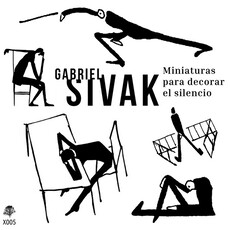Der 1979 geborene und in Paris lebende französisch-argentinische Komponist Gabriel Sivak hat ein facettenreiches Album mit Miniaturen vorgelegt. Er nennt es « eine Sammlung von Polaroids, flüchtigen Momenten, unwahrscheinlichen Situationen, die in Miniaturen materialisiert wurden ».
Das beinhaltet « Franz Kafkas Zeichnungen, die flüssige Texturen inspirieren, Guillaume Appolinaire, der neben einer alten Druckmaschine den Proletarier flüstert, eine Akkordeonreise über drei ferne Meere, komplexe Polyrhythmen aus Indien, der Liebe und einem Kinderorchester, das versucht, einen Elefanten zu wecken. »
Das Programm beginnt mit dem erregten Klavierstück Kathakali. Danach kommt ein wunderbar evokatives Stück, Miniaturas para decorar el silencio für Ondes Martenot und Harfe, das Vogelgarten, Wüstencanyon, blubberndes Wasser und Wind klanglich an das Ohr bringt.
Ultramar für Akkordeon beschreibt spannend und mysteriös das Meer von Celebes, die Barentssee und die Tasmanische See.
Au prolétaire vereint eine Geräuschkulisse mit dem Text von Apollinaire. Das Lied Moi, baiser Jaune entstand auf ein Gedicht von Gilles de Obaldia. Das total schräge Orchesterstück Musique pour réveiller un éléphant führt zu Líquido, einem ätherischen Werk für einen (feinfühligen) Schlagzeuger, mit dem dieses Album endet, mit dem Gabriel Sivaks Phantasie die des Hörers anregt.
Gabriel Sivak, a French-Argentinian composer born in 1979 and living in Paris, has released a multifaceted album of miniatures. He calls it « a collection of Polaroids, fleeting moments, and unlikely situations materialized in miniatures. »
It includes « Franz Kafka’s drawings, which inspire fluid textures; Guillaume Apollinaire whispering to the proletariat next to an old printing press; an accordion journey across three distant seas; complex polyrhythms from India; love; and a children’s orchestra trying to wake an elephant. »
The program begins with the exciting piano piece Kathakali. Next is the evocative piece Miniaturas para decorar el silencio for ondes Martenot and harp, which evokes the sounds of a bird garden, a desert canyon, bubbling water, and the wind.
Ultramar for accordion describes the Celebes Sea, the Barents Sea, and the Tasman Sea in an exciting and mysterious way.
Au Prolétaire combines a soundscape with text by Apollinaire. The song Moi, Baiser Jaune is based on a poem by Gilles de Obaldia. The bizarre orchestral piece Musique pour réveiller un éléphant leads to Líquido, an ethereal piece for a sensitive percussionist, concludes the album. With this piece, as with the others, Gabriel Sivak stimulates the imagination of the listener.


















